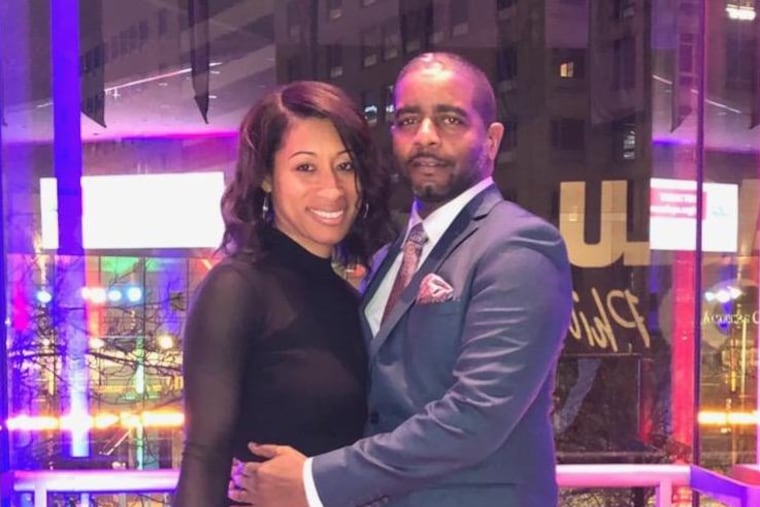Lifetime parole forces families to live with invisible shackles | Opinion
We live with the fear of my husband’s parole being revoked for a minor infraction.

I finally met Bobby Harris in May of 2019, but I say we were destined to meet because we attended the same Get Set program at Zion Baptist Church in the 1970s and then later, Edward T. Steel Elementary School. We don’t recall meeting during those years, but that was the beginning of our history, and part of the reason I am dedicated to ending parole in the state of Pennsylvania as it currently exists.
Our paths crossed, then split, and the next recollection I have of Bobby Harris was in 1992. The Inquirer wrote an extensive article on children sentenced to life imprisonment. Instead of humanizing children, The Inquirer pushed the prevailing image of the “super predator.” Although I had no recollection of that name or face, there was 18-year-old Bobby Harris’s photo, front and center, already three years into serving a life sentence. I remember wondering how he ended up there. I kept that face etched in my memory for many years, as I watched people in my family cycle through the carceral system.
» READ MORE: The nation’s oldest juvenile lifer, Joe Ligon, left a Pa. prison after 68 years
In 2012, the U.S. Supreme Court ruled it unconstitutional to sentence a child to a lifetime prison sentence. In 2017, Bobby went before a judge who exclaimed in the hearing that she had never seen a person with such an exemplary record and released him. Bobby and many other juvenile lifers were released. However, for each and every one of them, release was not the end of their sentence. Bobby and many others were subject to lifetime parole.
Although our lives moved beyond our initial history, this same young man who was considered young and ruthless is now my husband.
Lifetime parole is unconstitutional. For Bobby and many others, while they are technically free, they live with invisible shackles. Any infraction — however small — that his parole agent considers a violation can lead to an automatic five-year prison sentence for him. Violations can be subjective. Violations can be minor. It does not matter: As a parolee, you’re guilty before you’re found to be innocent.
Bobby, who was once considered “young and ruthless,” rehabilitated himself — there is nothing about our prison system that is designed to do that. While incarcerated, Bobby taught himself to read, became president of the Lifers Association at SCI Dallas with the support of each of his fellow prisoners, he has collected funds from prisoners who make 19 cents per hour at SCI Dallas to feed homeless veterans, as well as started a scholarship for children whose parents were victims of crime. Bobby became a mentor, worked with victim advocacy organizations, garnered support of numerous elected officials for his diligent advocacy work. And yet, we continue to live on unconstitutional lifetime parole. I say “we” because when a loved one is on parole, everyone in that family is on parole.
» READ MORE: Life after 'life': After 21 years in prison, an exoneree's return home is nothing like he expected
We live with the fear of his parole being revoked. At a recent press rally — hosted by members of the Pennsylvania State Assembly — Bobby spoke about the dire COVID-19 crisis in prison. He was called by the parole office right after and required to report. It was terrifying because we had no idea if Bobby would be disciplined, or even arrested, because he made a speech that might have upset people who hold his freedom in their hands. He is subject to the control of the parole office until he is dead. Our entire family is.
Sunset legislation for parole would allow for the automatic termination of parole after a certain time frame. Currently, there is no discussion in the works regarding parole reform among Pennsylvania elected officials, as there have been some failed attempts made as recently as 2020. However, a number of individuals and advocacy groups are working on organizing efforts to bring their arguments to elected officials once again.
My question is: If individuals who were incarcerated have been deemed rehabilitated enough to be released back into society, then why is it necessary to have parole indefinitely attached to them?
In the end, Bobby was able to avoid severe punishment, because of his strong reputation and the support of influential folks, but there are others who live under the same threat and don’t have the same voice. We must move past this racist and unconstitutional system that subjects people to a lifetime of control. We deserve sunset legislation.
Ramona Harris is an activist and vice-president of Unincarcerated Minds, a Philly-based nonprofit that provides returning citizens and citizens from marginalized communities with life-sustaining resources.
The Inquirer is one of more than 20 news organizations producing Broke in Philly, a collaborative reporting project on solutions to poverty and the city’s push toward economic justice. See all of our reporting at brokeinphilly.org.